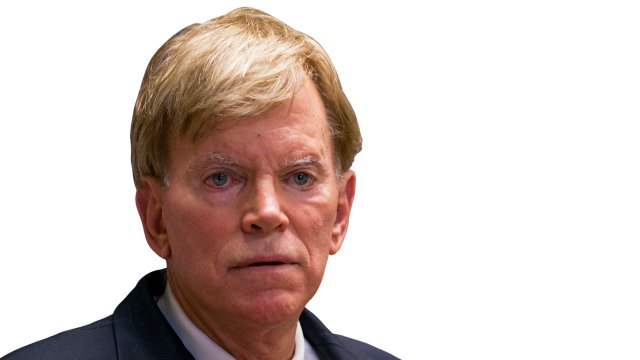Twitter has finally booted David Duke, a former KKK grand wizard and founder of the KKK revival group the Knights of the Klu Klux Klan.
Why has it taken years for a company whose policies explicitly bar “individuals who affiliate with and promote” violent extremist groups? Gizmodo wondered about this earlier this month and asked Twitter, to which the company replied that “Duke is not currently a member of the KKK and has distanced himself from the organisation publicly.” Nothing from Duke’s daily ranting indicated that he’d dropped the racism, just that he was a free-agent type of racist. Bewilderingly, it still doesn’t explain why Richard Spencer, head of the white supremacist National Policy Institute, is still on the platform. (Today, Twitter declined to comment to Gizmodo on why this is.)
Duke’s account has been active since 2009, and, as of yesterday, he had over 53,000 followers.
Previously, Twitter said that it had temporarily suspended Duke’s account and culled content, telling Gizmodo earlier this month that it would permanently ban the account if he continued to violate rules. But generally, in a recap of its guidelines, Twitter indicated that the hate could stand so long as the tweets didn’t explicitly call for hurting people or promoting violence against specific groups.
For years, Duke has screamed on Twitter about supposed “Zioglobalism,” called Black people “radical savages,” defended the Nazi salute, and constantly used the anti-Semitic triple parentheses, or “echo” symbol, intended to point at people of Jewish heritage. He spewed hate at homosexuality and transgender “insanity,” calling gender dysphoria a “sick” product of the media. Duke threateningly tweeted the names and faces of a group of Antifa protesters, calling them “the faces of domestic terror,” which I won’t link to here. Even if all of that flies under a technicality, there is simply no excuse under Twitter’s hateful conduct policy, which prohibits “inciting fear about a protected category,” for which Twitter’s example is “all [religious group] are terrorists.” Duke loved to call people terrorists, but most specifically to Twitter’s example, “Israel.” That this guy espouses hate doesn’t exactly require a nuanced reading.
Toward the end of Duke’s run on the platform, Twitter started putting “sensitive material” labels on his tweets, but it mostly blocked his racist memes and links, not his commentary.
“The account you referenced has been permanently suspended for repeated violations of the Twitter Rules on hateful conduct,” a Twitter spokesperson said in an email. “This enforcement action is in line with our recently-updated guidance on harmful links.” Those include links to content that harasses people based on race or ethnicity.
It took YouTube until last month to do the same. Weeks after that ban, Duke tweeted:
The fact that Google and Youtube are 100% owned and run by radical Zionists who give millions of dollars to Jewish causes and to proIsrael-biased Wikipedia – has no impact on the tech company that controls 85 per cent of all Search engines. Got that? Goy?
In late June, an unverified account for Duke was created on the “free speech” Facebook copycat Parler. The social network is rife with fake accounts, but it looks to be a promising candidate for the right-wing exodus. Earlier this month, Republican Reps. Jim Jordan and James Sensenbrenner of the House Judiciary Committee sent a letter to the platform’s CEO extolling Parler’s “commitment to free expression,” though they didn’t necessarily point to what freedoms the other platforms are denying, which, based on virtually every prominent example of Twitter and YouTube’s “censorship,” is freedom to spread misinformation, hatred, and threats. For whatever reason, they’ve kept complaining about Twitter and used it anyway as perfectly good conservative-friendly, liberal-enemy-free alternatives have come and gone.
